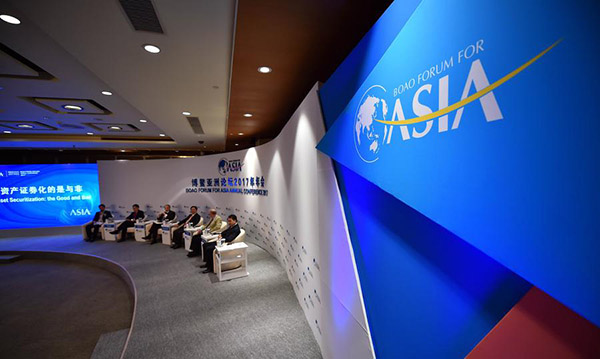Academics champion economic globalization as Boao forum concludes

The Boao Forum for Asia Annual Conference 2017, which was themed "Globalization and Free Trade: The Asian Perspectives," was held from March 23 to 26 in Boao, South China's Hainan Province.
Commenting on the recent Boao Forum for Asia Annual Conference 2017, scholars said economic globalization is essential and emphasized China’s role in it.
Under the theme “Globalization and Free Trade: The Asian Perspectives,” the forum was held from March 23 to 26 in Boao, South China’s Hainan Province.
“Economic globalization has injected strong impetus into the prosperous development of the world, greatly benefiting developing and developed countries alike,” said Dai Changzheng, dean of the School of International Relations at the University of International Business and Economics.
Stressing that developing countries are participants, beneficiaries and supporters of economic globalization, Sheng Bin, a professor of international economics at Nankai University, said they have grasped opportunities in the process and realized their own advantages, thus gradually blending into the global production system.
Developed countries also have motives to push ahead with economic globalization, Sheng said, arguing that science and technology, finance and new media in the West are calling on their own nations to return to the track of economic globalization.
Asia was the main lens through which participants of the forum viewed globalization and free trade. Though the global economy plunged into a structural downturn after the 2008 financial crisis, Asia has become a significant force driving the world economy.
Sheng pointed out that Asian countries follow unique paths and models in economic and trade cooperation while forming interdependent industrial, supply and value chains, building solid economic groundwork for regional integration.
“Economic integration in Asia is powered by fundamental and institutional forces,” Sheng said, adding that the former is determined by the market, while the latter is decided by human factors.
By fundamental forces, he meant Asian countries have brought into being interconnected regional industrial and value chains through a variety of intermediate products, components, services, trade and investment. When it comes to institutional forces, Asian countries are devoted to liberalizing and facilitating trade and investment within the region by reaching free trade or investment agreements, Sheng said.
The negotiations for the Regional Comprehensive Economic Partnership have reached a critical stage, and the Free Trade Area for the Asia-Pacific initiated by China is progressing steadily. A high-standard network of free trade zones will unleash policy and institutional dividends for the regional economic integration of Asia, Sheng added.
With the improvement of its economic strength and international status, China’s economic policy trend has caught the eyes of the world, with topics and plans China raises to promote economic globalization receiving increasing attention.
Huo Jianguo, vice-chairman of the China Society for World Trade Organization Studies, noted that the global economy has shown signs of resurgence since the latter half of 2016, but something has to be done to shore up market confidence.
In this scenario, China’s stable economic growth has had a positive influences on the world economy. Opening up the domestic market, firmly upholding the WTO-represented backed multilateral trade system and actively taking part in global governance, the country has sent positive signals and boosted global confidence, Huo said. “China is acting as a propeller and guide in the special stage of economic globalization,” he added.
China’s advocacy of economic globalization and free trade is development -oriented, Dai said. Holding high the banner of open economy and trade liberalization, China strives to optimize the environment for foreign investment, thereby bringing mutual benefits to other countries when they invest in the country. Innovating cooperation concepts and mechanisms, it has established such institutions as the Asian Infrastructure Investment Bank and Silk Road Fund, thus crystalizing and implementing the idea of “community with shared future,” Dai said.
Also China is a “stabilizer” of regional security, committed to creating an atmosphere for peaceful and reciprocal regional cooperation. The “Belt and Road” initiative, particularly, addresses root issues, like infrastructure, interconnectivity and industrial technical upgrade under the principles of co-consulting, co-building and sharing. China has invested in manpower, materials and financial resources in advance to ensure smooth cooperation, leading to the growth of regional economy. This is a “recipe” China offers for economic globalization, Dai said.
Lü Mengdi is a reporter at the Chinese Social Sciences Today.
